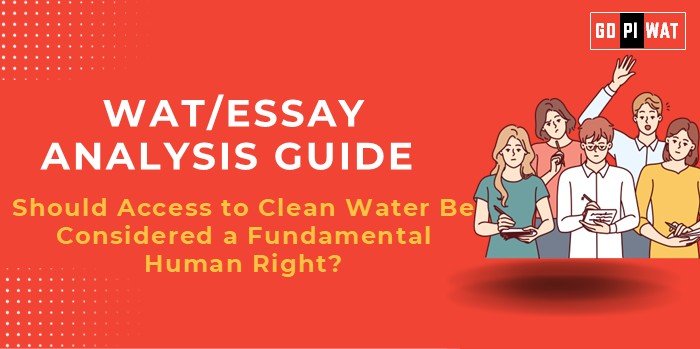📋 Written Ability Test (WAT)/Essay Analysis Guide
💧 Should Access to Clean Water Be Considered a Fundamental Human Right?
🌐 Understanding the Topic’s Importance
Clean water as a fundamental right intersects with health, equity, and economic growth. It underscores corporate responsibility and policy advocacy, critical for future leaders in business and governance.
📝 Effective Planning and Writing
- Time Allocation: Planning: 5 min | Writing: 20 min | Review: 5 min
- Preparation Tips: Research SDG 6, climate change impacts, and global case studies.
✨ Introduction Techniques for Essays
- Contrast Approach: “While billions have smartphones, 2.2 billion lack safe water—an irony demanding urgent attention.”
- Solution-Based Lead: “Universal access to clean water is not a luxury but a solvable global imperative.”
📂 Structuring the Essay Body
- Achievements: Include success stories like Singapore’s water reuse and India’s rural water schemes.
- Challenges: Discuss funding gaps, climate risks, and governance issues.
- Future Outlook: Recommend partnerships, sustainable practices, and innovations in water management.
🔑 Concluding Effectively
- Balanced Template: “Clean water is both a necessity and a right. Bridging resource gaps is critical for sustainable and inclusive progress.”
- Global Comparison Template: “As Singapore demonstrates scalable solutions, global cooperation can turn water access from a privilege into a right.”
📊 Analyzing Successes and Shortcomings
- Key Achievements: Improved health, reduced inequality, and global water campaigns.
- Challenges: Inequality, lack of funding, and climate pressures.
- Global Context: Highlight contrasts like Cape Town’s crisis vs. Singapore’s success.
🌍 Recommendations for Sustainable Progress
- Strengthen global partnerships like the Water Action Decade (2018-2028).
- Promote community-led water conservation and management.
- Enhance water recycling technologies and funding mechanisms.
✍️ Sample Short Essays
Balanced Perspective:
“Universal water access is vital for health and equity but needs sustainable frameworks to avoid overuse and waste.”
Solution-Oriented:
“Investing in water infrastructure and technology can transform lives, reduce inequalities, and support economic growth.”
Global Comparison:
“While Singapore sets a benchmark in water reuse, countries like India can learn and innovate for scalability.”


